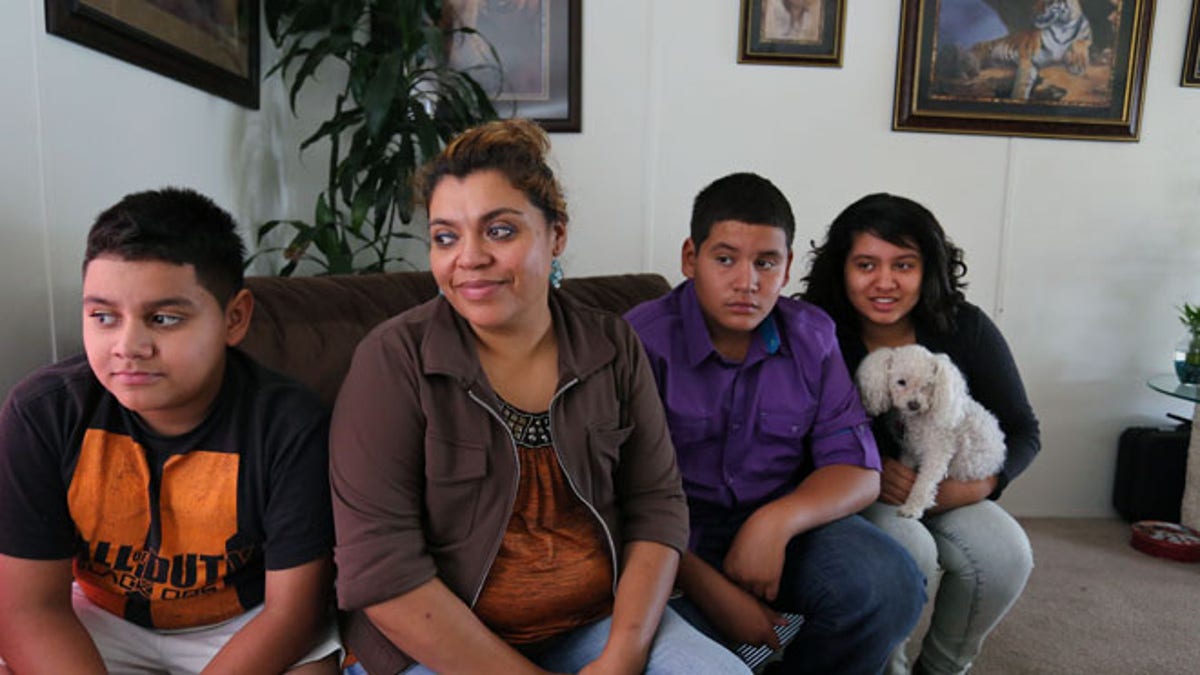
July 31, 2014: Adriana Gaytan, who came to Colorado in 1997 from the Mexican state of Zacatecas, second from left, sits at home with her children who were born in the U.S. from left to right, Osbaldo, 11, Oscar 13, Indhira, 14, and their dog Kissy, in Aurora, Colo. (AP)
DENVER – Thousands of immigrants have signed up to take advantage of a Colorado law that allows them to get drivers' licenses and identification cards beginning Friday, a heavy demand causing frustration for those who must wait.
About 9,500 people are signed up for appointments through the next 90 days to get the documents, with more people getting scheduled every day. Both people in the country illegally and those who have temporary legal status will qualify.
The law is expected to receive tremendous scrutiny both from opponents who see it as legitimizing illegal behavior, and supporters who say it will lead to safer roads because drivers will know the rules, and law enforcement will correctly identify people in traffic stops and accidents.
Colorado was among eight states that passed laws last year allowing driver's licenses for people in the country illegally. Two of those states, Illinois and Nevada, have already started issuing the documents. California plans to start in January.
The Colorado Department of Revenue, which will administer the program, has spent the previous weeks preparing for the rollout and fixing glitches, including a website crash.
When people were able to start making appointments July 1, the website stopped working after being overwhelmed with traffic, reaching a high of 107,500 hits hourly. The appointments are being handled at five locations throughout the state -- Denver, Aurora, Colorado Springs, Fort Collins, and Grand Junction.
"We're seeing that a lot of people are really excited about this program. They can't wait," said Barbara Brohl, the department's executive director.
But the rush has created frustration for those who have been unable to make an appointment, like 41-year-old Adriana Gaytan. Gaytan, who lives in Aurora, came to Colorado in 1997 from the Mexican state of Zacatecas.
For Gaytan, having a license would bring peace of mind.
"It's going to help us so that, for example, we're not put in the hands of immigration officials, so police don't view us as if we were criminals," she said in an interview in Spanish. "I think it's going to give us a valid identification to show police."
Gaytan said her husband has previously landed in deportation proceedings because he was pulled over and didn't have a license.
Immigrants with temporary legal permits don't have to make appointments, only those in the country illegally. Those without legal status must show documents like a utility bill to prove they've lived in Colorado the previous two years, in addition to an identification number they've used to pay taxes. They must also show a passport or other identification from their home country.
Those with a temporary legal status must present the documents that prove that, as well as evidence that they're Colorado residents.
Driver's licenses will cost $50.50, higher than the $21 that legal residents pay. Identification cards will be $14, also higher than the $10.50 paid by everyone else. The new program will be supported by user fees.
The documents must be renewed every three years, and to get licenses, people will have to pass driving tests. The identification documents will be marked to say they can't be used for voting or to obtain federal benefits.
"This program is designed specifically to allow folks to who live in Colorado, who pay taxes in Colorado, to become licensed and insured," said Sen. Jessie Ulibarri, D-Denver, the sponsor of the legislation. All drivers are required to be insured, but the new law won't guarantee that immigrants will get insurance.
Still, Ulibarri argues that creating a system for immigrants to get licenses, and therefore have a pathway to get insured, will benefit everyone.
Republican lawmakers have criticized the law.
"For the Colorado government to approve of them being here illegally, when it is the job of the government to enforce the laws of our country, is embarrassing," said Sen. Ted Harvey, R-Highlands Ranch.
In Oregon, one of the eight states that passed a driver's license legislation last year, opponents collected enough signatures to put the law on hold and ask voters in November whether it should be implemented.
New Mexico passed a law in 2003 allowing licenses for people in the country illegally. It was signed by Democratic Gov. Bill Richardson. Republican Gov. Susana Martinez has tried unsuccessfully to repeal the law.

